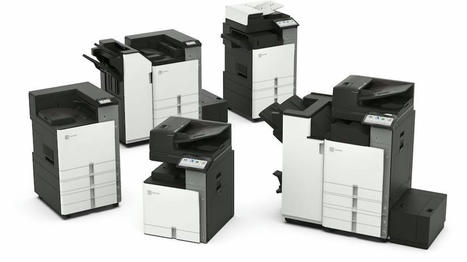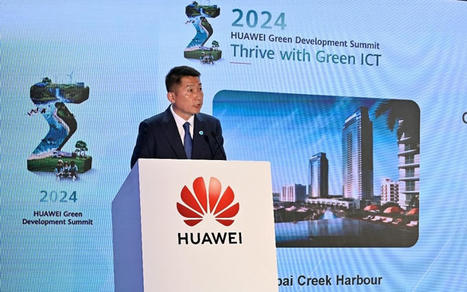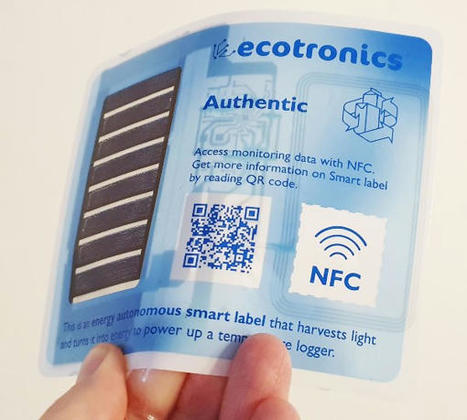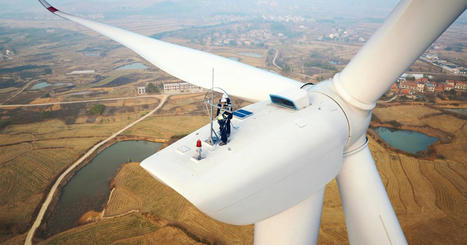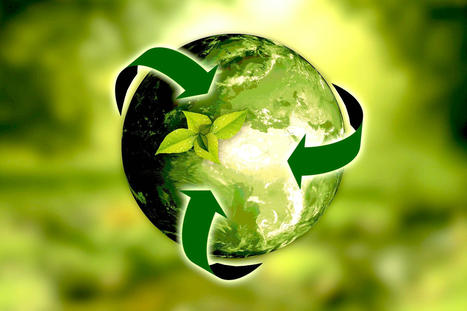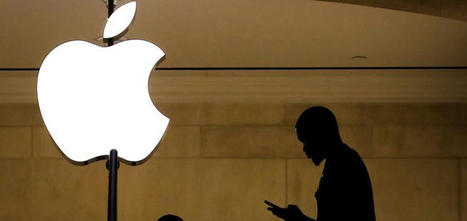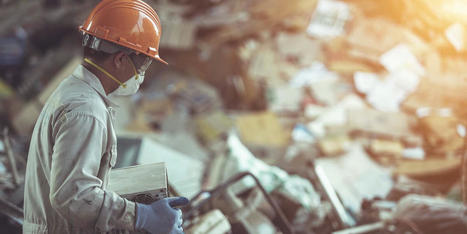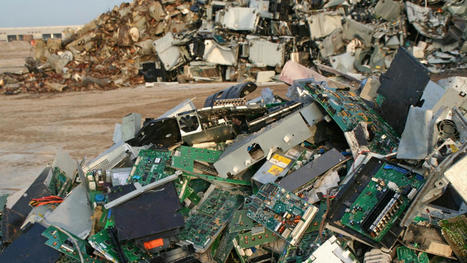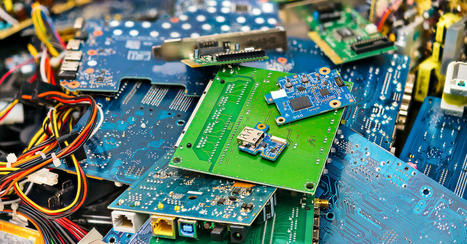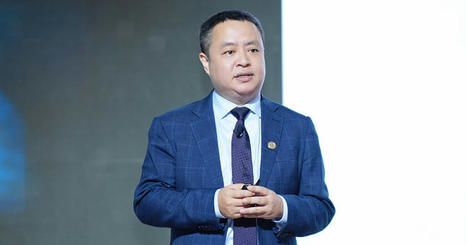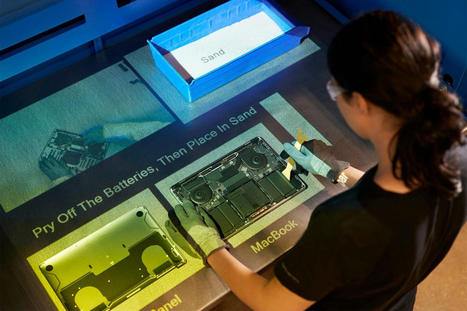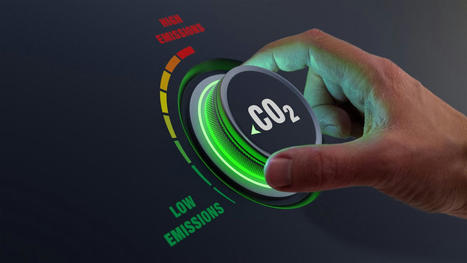 Your new post is loading...

|
Scooped by
EcoVadis
|
Apple has published its annual environmental report detailing its progress towards becoming completely carbon neutral by 2030. While critics will, of course, condemn the report as “greenwash,” it’s hard to identity many other big firms working quite as hard to be so transparent across the impact of their business.

|
Scooped by
EcoVadis
|
Printing giant Lexmark has announced what it claims are a series of industry-disrupting printer models designed to “reset the industry standard,” and it has business customers firmly in its sights.
The company’s new 9-Series models promise to deliver versatility and simplicity, but more importantly, Lexmark also wants to tackle sustainability with its latest additions.

|
Scooped by
EcoVadis
|
[Barcelona, Spain, February 29, 2024] Huawei held the Green Development Summit, themed "Thrive with Green ICT", during MWC Barcelona 2024. At the summit, guests from the International Telecommunication Union (ITU), MTN Group, International Union for Conservation of Nature (IUCN), UN Educational, Scientific and Cultural Organization (UNESCO), Kenya's ICT Authority, and Indonesia's Bandung Institute of Technology discussed how digital technology can be used to promote green development and enable an inclusive and sustainable digital world.
Jeffrey Zhou, President of ICT Marketing at Huawei, noted in his speech that digital technology has become a key enabler for global sustainable development. He stressed that Huawei would continually work on technological innovation alongside global partners to enhance digital inclusion, promote thriving digital talent ecosystems, and help enable an inclusive and sustainable digital world.

|
Scooped by
EcoVadis
|
Intel is seeking alternatives to harmful chemicals that the electronics industry has used for decades, amid growing concerns about the potentially negative impacts on the environment and human health.
The chipmaking biz is again pushing the environmental bandwagon, committing to become the "industry's most sustainable foundry" and joining with other tech outfits to develop an industry-wide net zero roadmap.

|
Scooped by
EcoVadis
|
A study by the VTT Technical Research Center of Finland reports that changing the manufacturing of electronics can improve their environmental impact. For example, one of the project’s most significant findings showed that environmental impact could be reduced by 86% when additive printing methods are used to create flexible electronic components, as reported in detail by LUT University.
The project showed several areas of electronics manufacturing where an impact on environmental footprint and sustainability is possible.

|
Scooped by
EcoVadis
|
With a 100 percent recycled plastic back and the only smartphone maker that utilises Fairtrade gold in its supply chain, Amsterdam-based Fairphone is not only taking a vertical but an industry.

|
Scooped by
EcoVadis
|
A new wave of electronics manufacturing is on the horizon, aiming to satisfy the increasing demand for sustainability and mitigate the impact of volatile energy prices. With the electronics industry accounting for 4% of global greenhouse gas emissions, it requires substantial innovation to reduce its environmental footprint. Fortunately, this area has a lot of movement, with several potentially revolutionary technologies entering the scene. IDTechEx's report, "Sustainable Electronics Manufacturing 2023-2033", explores the key opportunities for sustainable innovation and the most promising new manufacturing approaches. The report concentrates on the fundamental building blocks of electronics - printed circuit boards (PCBs) and integrated circuits (ICs).

|
Scooped by
EcoVadis
|
There is broad agreement that the ICT sector and digitalisation can have a favourable impact on international and regional climate targets, by enabling green and digital transitions. Companies in the connectivity sector claim they want to make responsible and sustainable investments. For them, one of the key challenges will be to balance their role as an enablers of green and digital transformations with operational resources required to implement their own sustainability efforts. Moreover, several of the EU’s Green Deal and Digital Decade 2030 targets require upgraded infrastructure and increased private investment.

|
Scooped by
EcoVadis
|
The need to act on both individual and collective responsibility is more important than ever, says Louise Koch, Dell Technologies
As part of their commitment to future proof-recovery, governments worldwide have expressed their desire to ‘build back better’. To determine the success of government’s efforts to reboot post-pandemic economies alongside addressing the seismic challenges of climate change however, we should instead look to their desire to ‘build back greener’.
The good news is that by harnessing digital innovation across key sectors matched with a willingness to act, we still have time to avoid the worst-case scenarios and create a better tomorrow.
Apple has set a public goal to go completely carbon neutral in its supply chain by 2030, and it’s out with an update on those efforts today. According to Apple, its manufacturing partners now support over 13 gigawatts of renewable electricity around the world, while more than 250 Apple suppliers are committed to relying completely on renewable energy by 2030.
In a press release today, Apple gave an update on its efforts to go fully carbon neutral by 2030. For its global corporate emissions, Apple is already carbon neutral. It supports 1.5 gigawatts of renewable electricity around the world to power all corporate offices, data centers, and retail stores. It has also invested in 500 megawatts of solar and wind in China and Japan to address upstream supply chain emissions.
Apple’s efforts are now largely focused on its supply chain and manufacturing partners. Apple says that more than 40 of its manufacturing partners have joined the Apple Supplier Clean Energy Program within the last year, making for a total of over 250 suppliers across 28 countries.
The company is also offering a “Clean Energy Academy” for its partners to help “identify and implement solutions for clean energy and carbon reductions.”
Despite the common belief that data center operations and the cloud generate information technology’s most significant environmental impacts, the embodied carbon of endpoint devices accounts for nearly half of overall IT greenhouse gas emissions in most enterprises.
As digital business accelerates, the use of corporate endpoints and peripherals continues to grow exponentially. Consequently, managing the environmental sustainability of end-user equipment is becoming a core responsibility and priority for IT leaders.
Yet many of them don’t realize that the decisions they make at every step of the device life cycle have a significant impact on IT sustainability. In addition to supporting corporate environmental, social and governance goals, strategic sustainability decisions can also provide benefits such as cost savings, modernization and infrastructure resilience.
The key to harnessing such benefits is to use the circular economy as a guiding framework for device sustainability. Here are the steps that IT leaders can take to rationalize, retain and restructure the use of devices continually, from procurement though disposal, in a way that equally serves the planet, engages employees and supports the business.
Apple said Tuesday that it is urging suppliers to vastly reduce greenhouse gas emissions as the tech giant works to make its entire supply chain carbon neutral by 2030.
The company is asking manufacturers to decarbonize Apple-related operations by taking steps such as running on 100% renewable electricity. Apple will track progress through yearly audits.
As part of the company’s overarching sustainability goals, Apple also announced plans to construct large-scale solar and wind projects in Europe with projects ranging between 30 and 300 megawatts. The goal of the projects is to produce enough renewable energy to power all devices on the continent with low-carbon electricity.
Circular from the start
Startups have the opportunity to build businesses based around the circular economy from the start of their lifecycle.
“Startups have the ability to build their businesses from scratch, truly disrupt the status quo and educate both consumers and businesses, in the process”
“Startups play a crucial role in helping the economy transition to the circular economy, because they don’t have the red tape or consumer expectations big tech does,” says Thibaud Hug De Larauze, cofounder and CEO of scaleup Back Market. “They have the ability to build their businesses from scratch, truly disrupt the status quo, and educate both consumers and businesses in the process.”
Back Market, founded in 2014, says it’s now the globe’s biggest online marketplace for refurbished devices and appliances, with over 6m users and over €1bn raised.
According to figures cited by De Larauze, as much as 70% of existing toxic waste is due to disposed electronics, while only 12.5% is recycled.
De Larauze says big tech is always looking for the new — offering expensive products that they want consumers to purchase on a yearly, or biennial basis. That creates two problems for customers: affordability and impact on the environment.
“Refurbished technology can solve both of these problems. Not only are renewed devices much more affordable, they are key to creating a circular economy and drastically reducing the impact of technology on the environment,” says De Laurauze.
This impact of technology and electronic devices can also be mitigated by renting equipment rather than purchasing it. This is particularly useful for smaller businesses and startups that may not know what equipment they need as they begin their journey.
|

|
Scooped by
EcoVadis
|
Sub-Saharan Africa stands at the brink of a digital revolution, where telecommunications and technology are poised to be the driving forces behind sustainable socio-economic development. With a youthful population and vast economic opportunities, the region is embracing digital transformation as a pathway to inclusive growth and prosperity.

|
Scooped by
EcoVadis
|
With e-waste and packaging waste still growing rapidly worldwide, embracing sustainability has become an urgent priority for every company in the technology space and beyond. Doing so requires a top-down view of how products are made, how they are used, how they are packaged, and how they are managed at their end of life.
The technology industry has been engaged with these issues for many years, through circular economy approaches and careful thought around everything from packaging to shipping. Small steps, such as using materials like biobased packaging or closed-loop recycled content, can add up to make improvements in the environmental impact of the technology we use every day.

|
Scooped by
EcoVadis
|
We're creating electronic waste almost five times faster than we're recycling it using documented methods, according to a United Nations report released on Wednesday.
And the economic impact is significant. While e-waste recycling has benefits estimated to include $23 billion of monetized value from avoided greenhouse gas emissions and $28 billion of recovered materials like gold, copper, and iron, it also comes at a cost – $10 billion associated with e-waste treatment and $78 billion of externalized costs to people and the environment.

|
Scooped by
EcoVadis
|
Hexagon’s Manufacturing Intelligence division and Altium have entered a strategic partnership to help with the design and manufacturing of electronics and to make the process more environmentally sustainable.i

|
Scooped by
EcoVadis
|
Sustainable manufacturing is a hot topic in the engineering world today, and for good reason. As technology advances and more electronics enter the market, e-waste becomes an ever-growing problem.
Fortunately, engineers can use sustainable manufacturing strategies to reduce or even eliminate e-waste. Sustainable manufacturing techniques focus on reducing waste while maximizing resources—a win-win situation that benefits our planet and business bottom lines.

|
Scooped by
EcoVadis
|
Marie McCarthy, Consumer Electronics Revenue Director at Centric Software, looks at the consumer electronics industry using data to improve sustainability
Consumers are becoming increasingly concerned about the sustainability of products each year. Sustainability is ranked by 66% of consumers as one of the top five drivers behind a purchase decision, up from 50% in 2021, according to Simon Kucher’s 2022 Global Sustainability Study. Additionally, 75% of global consumers feel environmental sustainability is as important or more important to them now than it was in 2021.
This shift in consumer behaviour is particularly challenging for consumer electronics brands, retailers and manufacturers, especially as reports continue to emerge about growing quantities of e-waste and its environmental impact. The consumer electronics industry is taking steps to address this issue by improving post-use disposal, such as using more ‘closed-loop’ materials. In the future, it seems likely that brands will develop products in ways that make it easier to recycle their parts. However, recycling can’t be the whole story. A multifaceted solution is needed to fully address the problem of e-waste and increase sustainability.

|
Scooped by
EcoVadis
|
Demand has not peaked. Some 1.43 billion phones are sold annually. E-commerce sales continue to surge worldwide. As a result, e-waste is one of the fastest growing waste streams in the world. The UN forecasts that, on current trends, yearly e-waste generation will balloon to 74.7 million tonnes by 2030. The report called for a global reboot and a new vision for e-waste rooted in the ‘circular economy’ of reuse and recycling. But is a sustainable electronics industry possible?
Circular by design
Many companies, from fledgling start-ups to established tech giants, have been grappling with that question, and a number of organisations have sprung up to coordinate their efforts.
The Circular Electronics Partnership (CEP) was established in 2021 to unite experts, business leaders and global organisations in co-designing solutions for a ‘circular’ electronics industry. Alongside 40 companies, CEP produced a roadmap identifying the core barriers to sustainability faced by the industry, and the pathways towards circularity.

|
Scooped by
EcoVadis
|
While ICT and telecom providers like Ericsson use a small amount of the world's total energy demand overall, the industries that rely on ICT to do business worldwide - relying on high-speed, reliable communications - contribute to high demand and high carbon emissions.
The internet's evolution is driving a revolution in healthcare, business and society. But sustainability and efficiency in powering networks is a huge concern in the face of climate change. Companies must think beyond the bottom line to their impact on society and the environment.
Mats Pellback Scharp, Global Head of Sustainability at Ericsson, discusses the holistic aspects involved in strategizing what the ICT industry and Ericsson are doing to achieve a net zero carbon footprint through site efficiencies and emission-reducing strategies in this compelling podcast.

|
Scooped by
EcoVadis
|
Huawei Technologies, a global leader in information and communications technology (ICT) solutions, emphasised the crucial role of green ICT development in ensuring sustainable digital economic growth during a keynote delivered by Mr. Alex Wang, Senior Vice President of Huawei Carrier BG Marketing, at the SAMENA Leaders’ Summit.
In his address, Mr. Wang highlighted the evolution of intelligence and the need for co-development between ICT and energy technology. “Much like human evolution, our technology has evolved to become increasingly intelligent. Today, computing capability has grown by leaps and bounds and consequently, the corresponding energy consumption is also increasing. We firmly believe that green and low-carbon development, as well as digital and intelligent transformation are the two main forces driving the fourth industrial revolution forward”.
Apple will use 100% recycled cobalt in batteries by 2025. It already uses large quantities of recycled rare earths and tungsten in products and has begun using AR to support disassembly.
Humans are facing an existential crisis in climate change. We are also facing a crisis of collective action. As a species, we have every reason to slow the rise of global temperatures, but taking steps to cut carbon emissions is generally not in the short-term interest of individuals, companies, or countries. Where does that leave IT organizations?
IT systems all around the world consume ever-increasing amounts of electric power, making them a critical factor in increasing carbon emissions. Many people in the industry are acutely aware of IT's climate impact and want to see it reduced, but minimizing IT's carbon footprint will entail a cost that many small businesses and multinational corporations are reluctant to bear.
Curious about what might incentivize a shift to greener tech, I spoke to IT leaders who are pushing back on climate change. I found people working at every level of organizational leadership—from the top down to the bottom up—and pursuing a variety of strategies to reduce carbon consumption in company products and business models.
Sustainable or green IT is not new. In fact, it has been a topic of discussion among IT leaders for decades. But the concept of sustainability in general, which the United Nations defines as “meeting the needs of the present without compromising the ability of future generations to meet their own needs,” is something people and organizations are prioritizing more than ever — and for good reason.
Concerns about the environment and climate change are front and center among world leaders, environmental advocacy groups, and society at large. Corporate executives and boards want their organizations to do their part — or at least be perceived as doing their part — to help.
The push for better environmental, social, and governance (ESG) initiatives has taken a high priority at many organizations, and this encompasses more efficient uses of technology.
|

 Your new post is loading...
Your new post is loading...





